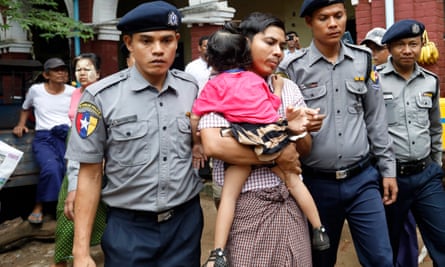In late October, in a meeting room inside Yangon’s famously brutal Insein Prison, Reuters reporter Wa Lone met his three-month-old daughter, Thet Htar Angel, for the first time. The moment he took the infant into his arms a warm, white substance trickled from her mouth on to his shirt. The baby had vomited on him. Wa Lone, desperate for the feeling of fatherhood, seemed pleased.
“When I tried to clean it up, he said: ‘Don’t do that. I want to keep it on the shirt,’” Wa Lone’s wife, Pan Ei Mon, told the Guardian during an interview in Myanmar’s main city. “When I came to visit him the next week, he was wearing the same shirt, and the stain was still there.”
Pan Ei Mon, 35, gave birth to Thet Htar Angel in August, while Wa Lone, 32, and his reporting partner Kyaw Soe Oo, 28, were on trial for allegedly possessing secret government documents that prosecutors said were “useful to enemies of the state”. They were convicted in September and sentenced to seven years in prison for violating Myanmar’s official secrets act. On Wednesday the pair will have spent a full year in prison.
Twelve months ago the men were arrested while reporting on a military massacre of 10 Rohingya men and boys in the village of Inn Din the previous September, during bloody counterinsurgency operations that displaced more than 700,000 people. UN investigators have said the Myanmar military carried out the operations with “genocidal intent”. In April a military court sentenced seven soldiers to 10 years in prison over the Inn Din massacre, corroborating much of Wa Lone and Kyaw Soe Oo’s reporting.
The guilty verdict was widely condemned – by the United Nations, European Union and countries including the US, Canada and Australia, who called for the men to be acquitted and pointed to glaring inconsistencies in the case against them.
During the trial a key witness, police captain Moe Yan Naing, testified that the arrest had been a setup aimed at quashing their reporting. Another prosecution witness said under cross-examination that he had written the location of the arrest on his hand so he would not forget it while he was testifying. Another claimed that he burned his notes of the arrest.
“The fact that they remain in prison for a crime they did not commit calls into question Myanmar’s commitment to democracy, freedom of expression and rule of law,” a spokesperson for Reuters said. “Every day they continue to be behind bars is a missed opportunity for Myanmar to stand up for justice.”
Pan Ei Mon says she was not prepared for the difficulties Wa Lone’s arrest would bring.
“Since I was pregnant, there was no one next to me. When I would go see the doctor I had my mother and my aunt with me, but I was not with my husband, so I felt very depressed. When I gave birth there were some people from Reuters there, but I was not with my husband. When I struggled to find an apartment there was no one by my side. I feel depressed. I struggle without my husband,” she said. “Sometimes I have no strength left to struggle.”
Pan Ei Mon visits Wa Lone in prison once every week, but she has only brought Thet Htar Angel to see him twice. Prison rules require him to request access to a private room in order to see his daughter, and the room is not always available. During their 30-minute meetings, Pan Ei Mon says, it is hard for Wa Lone to ignore the life he sacrificed in order to expose his country’s crimes.
“He says he feels sorry for not being with us. From the time we got married, we planned to have a child, and we talked about how we would raise one. He hasn’t been able to be involved in any of that. He has not been able to give the warmth of his heart to his daughter,” she said.
Kyaw Soe Oo has also been parted with his daughter, three-year-old Moe Thin Wai Zan. During the trial she would tightly embrace her father outside the court in the brief moments before he was bundled back into the police truck, and would cry “Papa, Papa!” as the van drove off.

Last month the reporters’ lawyers filed an appeal to a higher court. They will present their arguments to a new judge on 24 December. Defence lawyer Than Zaw Aung said the arguments would focus on “presenting the unjust and wrongful decisions of the original court”, adding that the political controversy surrounding the trial may have unduly influenced the first judge’s decision.
Pan Ei Mon says the appeal process will be an opportunity for Myanmar’s leaders to “understand and accept” Wa Lone and Kyaw Soe Oo, which she hopes will lead to an overturning of their verdict or a presidential pardon. If these efforts fail, however, the pair may be in prison for another six years.
Whenever Wa Lone may be released, Pan Ei Mon plans to pick up their life together where they left off. She has started taking English lessons so that he can finally study abroad, fulfilling a lifelong dream that has taken on new meaning since his country effectively branded him a traitor.
She said: “We feel like our family is unwelcome in this country. This is how social media makes us feel, and sometimes it gets me down. But other times, I feel like this experience makes me stronger and stronger.”
